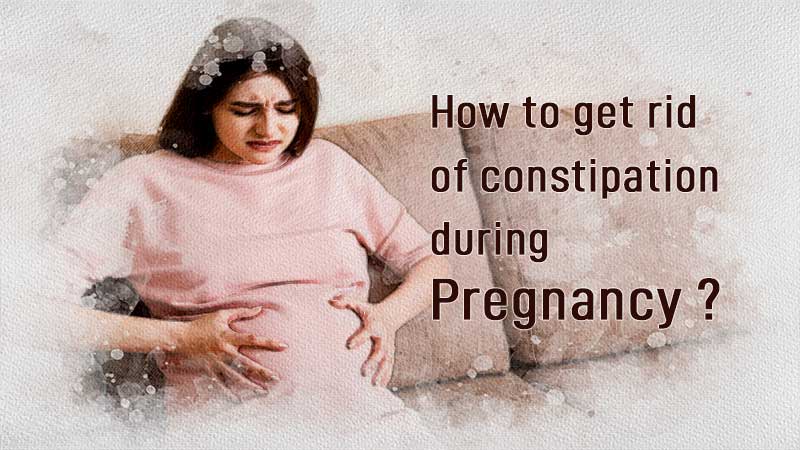How to get rid of constipation during pregnancy?
Verified By Dr. Sanchita Biswas | 01-Jun-2024
Carrying a child is an incredible experience, but it can bring physical discomforts. Constipation is a common complaint among pregnant women. Constipation during pregnancy can be uncomfortable and distressing, but there are effective ways to manage it. Dr. Sanchita Biswas, a renowned gynecologist at Kailash Hospital, Greater Noida, provides insights and remedies to alleviate constipation during this crucial time.
Table of content:
Constipation in pregnancy is a prevalent issue, affecting approximately 38% of pregnant women. "Nearly half of all pregnant women experience constipation at some point, so you're not alone!" says Dr. Sanchita Biswas, a renowned Gynaecologist at Kailash Hospital, Greater Noida. "There are a few reasons why this happens. First, progesterone, a hormone that increases during pregnancy, can relax the muscles in your intestines, slowing down digestion."
Dr. Biswas continues: "Additionally, your enlarged uterus puts pressure on your intestines, making it harder for stool to pass through. Iron supplements, essential for many pregnant women, can also have a side effect of constipation."
While occasional irregularity is normal, there are signs that indicate true constipation:
- Straining during bowel movements
- Feeling incomplete after a bowel movement
- Having fewer than three bowel movements per week
- Hard, dry stools
- Rectal pain
Black stools can be alarming, but during pregnancy, iron supplements can sometimes cause this discoloration. However, Dr. Biswas advises, "If you experience black stools along with severe abdominal pain, vomiting, or dizziness, consult your gynecologist immediately. The presence of these symptoms could indicate a need for further investigation."
Also read: How to Control Fasting Blood Sugar during Pregnancy?
Before opting for medication, consider trying these natural remedies for quick relief:
- Hydration Hero: Water is your best friend! Aim for eight to ten glasses of water daily. Warm water with lemon in the morning can also help stimulate your digestive system.
- Fiber Fiesta: Increase your fiber intake by incorporating fruits, vegetables, and whole grains into your diet.
- Exercise for Elimination: Regular exercise, like walking or prenatal yoga, can get your bowels moving.
- The Power of Prune Juice: Prune juice is a natural laxative. However, Dr. Biswas cautions, "Consult your doctor before consuming prune juice, as excessive amounts can lead to diarrhea."
For ongoing constipation relief, consider these strategies:
- Listen to Your Body: Pay attention to your body's natural cues and establish a regular bowel movement routine.
- Respond to the Call: Don't ignore the urge to have a bowel movement. Delaying it can make constipation worse.
- The Right Posture: Proper positioning on the toilet can make a difference. Try using a stool to elevate your knees slightly.
- Massage Magic: Gently massage your abdomen in a circular motion to stimulate bowel movements.
- Include High-Fiber Foods: Incorporate foods like bran, oats, apples, berries, broccoli, and carrots into your diet.
- Eat Smaller, Frequent Meals: Instead of three large meals, opt for smaller, more frequent meals to keep your digestive system active.
- Avoid Processed Foods: Limit your intake of processed foods and refined sugars as they can worsen constipation.
- Probiotics: Consider incorporating probiotic-rich foods like yogurt or a probiotic supplement after consulting with your gynecologist.
If home remedies aren't providing relief, consult your gynecologist. Dr. Biswas emphasizes, "There are safe and effective over-the-counter laxatives available for pregnant women. Your doctor can recommend the appropriate option for you."
Signs that require immediate medical attention include:
- Severe abdominal pain
- Blood in your stool
- Rectal bleeding
- Vomiting that doesn't subside
Also read: Understanding Peptic Ulcers: Causes, Symptoms, and Treatment Options
If dietary changes and home remedies are not effective, your doctor may recommend safe medications. Always consult your healthcare provider before taking any medication. Dr. Sanchita Biswas emphasizes that some over-the-counter laxatives are safe during pregnancy, but they should only be used under medical supervision.
Preventing Constipation During Pregnancy
- Regular Prenatal Check-Ups: Regular visits to your gynecologist can help monitor your digestive health and manage any issues early on.
- Monitor Iron Supplements: Iron supplements can contribute to constipation. Consult your doctor about possible alternatives or adjustments.
- Stay Active: Regular physical activity can significantly reduce the risk of constipation.
"Communication is key," says Dr. Biswas. "Don't hesitate to discuss your constipation concerns with your gynecologist at Kailash Hospital, Greater Noida. We can work together to develop a personalized plan to keep things moving smoothly and ensure a comfortable pregnancy for you."
Beyond Relief: Preventing Future Constipation
By incorporating these tips into your daily routine, you can help prevent constipation from recurring:
- Establish a Healthy Diet: Maintain a balanced diet rich in fiber and stay hydrated.
- Manage Stress: Stress can worsen constipation. Practice relaxation techniques like yoga or meditation.
Remember, you're not alone! Constipation during pregnancy is a common issue. With the right approach and the support of your doctor, you can overcome this challenge and enjoy a healthy, comfortable pregnancy.



 +91-9711918451
+91-9711918451
 international.marketing@kailashhealthcare.com
international.marketing@kailashhealthcare.com







